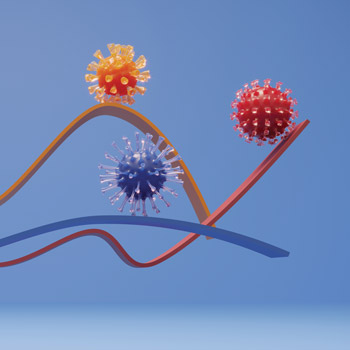Panel ponders postacute sequelae of COVID-19
The consequences of postacute sequelae of COVID-19 have led to research into this emerging condition.
Experts provided internists with answers on postacute sequelae of COVID-19 (PASC) at ACP's and Annals of Internal Medicine's COVID-19 Forum V, but they acknowledged still having more questions than answers about the condition themselves.
Led by Annals Deputy Editor Deborah Cotton, MD, MPH, FACP, panelists Capt. Lori Newman, MD, and ACP Members John T. Brooks, MD, and Aluko A. Hope, MD, discussed what is known so far about persistent symptoms after SARS-CoV-2 infection during the June 9 virtual forum (summarized in a paper published online by Annals on June 11 along with a recording of the live event).

The experts described the efforts to study and alleviate the problem, which began to be discussed almost as soon as the virus was discovered. “Shortly after the first couple people started recovering from acute SARS-CoV-2, there started to be cases reported of people suffering from lingering symptoms,” said Dr. Newman, a medical officer for the National Institute of Allergy and Infectious Diseases and co-chair of a working group of the NIH's PASC Initiative.
The publicity efforts of some of those initial patients spurred action on the health care issue, culminating in a $1.15 billion congressional allocation for PASC research last December. “They activated and energized a whole army of citizen scientists that helped make the scientific community aware of a brewing problem,” Dr. Newman said.
The NIH's Recover Initiative (online at recovercovid.org) recently released the first in a series of research opportunity announcements and expects to announce awards soon, Dr. Newman said. The plan is to focus on three types of studies: clinical cohorts, large real-world data sets, and autopsy investigations.
Scientists have already conducted and published a few studies on the topic, she noted. A systematic review, published by JAMA Network Open on May 26, found a lot of heterogeneity in PASC research. “These papers describe a wide array of symptoms, everything from dyspnea and fatigue to sleep disorders and memory loss,” said Dr. Newman. “The symptoms were broad-ranging.”
A British cohort study of patients hospitalized for COVID-19, published by The BMJ on March 31, provided additional worrisome data: high rates of readmission and new diagnoses of respiratory and cardiovascular diseases after discharge, more commonly in patients of ethnic minorities than White patients.
“If we are also seeing higher rates of PASC in our minority populations, this is going to enhance even further the existing health disparities we have in this country. We owe it to these patients to get to the root of this,” she said.
There are at least four theories to explain the persistent symptoms: direct cytotoxic effects, dysregulation of the renin-angiotensin-aldosterone system, endothelial cell damage and thromboinflammation, and dysregulation of the immune response. “There's also some thought that we may be seeing abnormal gut microbiomes, which may be contributing, and there are many other theories out there,” said Dr. Newman.
That's a lot of possible explanations, and the final answer will probably be that there is no single answer, she added. “It's unlikely that any one of these mechanisms is responsible for all of the different PASC phenotypes.”
This variation in the condition—”extraordinary diversity of not only signs and symptoms that people present with, but organ systems that are involved”—makes it hard to develop treatment guidelines, explained Dr. Brooks, a medical epidemiologist and the chief medical officer for the CDC's COVID-19 response.
In collaboration with organizations including ACP, the CDC did draft some interim guidance, published on the agency's website in April. The problems covered under the umbrella of “post-COVID conditions” can be managed in primary care but should involve teams of clinicians as needed as well as shared decision-making with patients, Dr. Brooks advised.
“We really encourage an approach that focuses on specific symptoms. So how do I manage my headache? Or if I have dysautonomia, how do I manage that?” he said. “It really needs to be a comprehensive management plan focused on improving physical health, mental, as well as social well-being and function.”
Dr. Brooks also mentioned some pitfalls to avoid in treating PASC. “We've been seeing, unfortunately, that some people may be prescribing opioids, anxiolytics, antidepressants,” he said. These drugs may be indicated for certain patients, he added, but it's important to avoid overusing them in this population.
Another challenge for treating clinicians will be the difficulty of assessment. “This is often a condition where there are not laboratory abnormalities present, or imaging may be normal,” said Dr. Brooks. “It's really critical for us to remember that this is something where we have to take people at their word as they present to us and really put in work to understand what could be going on.”
Dr. Hope brought front-line experience with that work to the forum. He cofounded the COVID-19 Recovery Clinic for Montefiore Medical Center in the Bronx, N.Y., last year, before moving on to become the medical director of the Long COVID-19 Program at Oregon Health & Science University in Portland.
Physicians at the clinics take a broad initial approach to their patients. “We really start off with structured assessments around multiple health domains—physical, cognitive, emotional—then using those structured assessments to really guide an interdisciplinary plan,” he said.
Patients are referred to medical subspecialties such as cardiology and pulmonology as needed, as well as other kinds of care that seem likely to help, including mental health treatment and rehabilitative and social services. (Insurers have not always agreed about the necessity of care, sometimes denying neuropsychology assessments and limiting physical therapy sessions, Dr. Hope noted.)
Since many in the forum's audience practice primary care, Dr. Cotton asked about their role in treating PASC. “The hope would be that over some period of time we could pass the care back to the primary care doctor with a really detailed assessment of what we thought was going on and how they could manage the things that we were seeing,” said Dr. Hope.
On that theme, Drs. Cotton and Hope discussed a hypothetical PASC patient with dyspnea on exertion and mildly abnormal pulmonary function. “Do you say ‘Exercise more. Push yourself to the limit’?” Dr. Cotton asked. “Or do you say, ‘You need to rest. You need to cut back’?”
More the latter, according to Dr. Hope, who also recommended keeping these limitations in mind when testing patients' cardiac or pulmonary function.
“The recommendation is not to push,” he said. “You really should be very thoughtful about what your limits are … Understand where your heart rate and where your ventilatory threshold is, and really keep below that and retrain up back to your baseline.”
These insights come in part from research on chronic fatigue syndrome, he noted. That's an important source of information on PASC, agreed Dr. Brooks, who also listed myalgic encephalomyelitis, postural orthostatic tachycardia syndrome, and mast cell activation syndrome as relevant models for care and recovery.
“These are people who've been living with something very similar, in many ways, to post-COVID … who could provide great advice to folks. And hopefully, what we learn about post-COVID will provide information to also help them,” he said.
Dr. Cotton also asked her colleagues' thoughts about another intervention that has been thought to possibly help PASC patients—COVID-19 vaccines. A study, published as a letter by Annals of Internal Medicine on May 25, looked at the effects of vaccination in 44 people with PASC and found that 23.2% saw their symptoms improve and only 5.6% reported worsening.
“Even though this was a very small study, and it needs to be studied on a much larger basis, this is promising in that it not only should be reassuring that vaccines are not exacerbating PASC, but it does suggest that vaccination may actually improve some PASC phenotypes over time,” said Dr. Newman.
It's “tantalizing data,” agreed Dr. Brooks. “I would certainly advise anybody who is experiencing PASC and post-COVID conditions to seek out vaccination when they can, both for preventing reinfection but also on the off chance that it might have some benefit.”
He noted that Americans are lucky to have easy access to the vaccines and that avoiding COVID-19 infection is undoubtedly the best method for preventing PASC, circling back to the point with which Annals Editor-in-Chief Christine Laine, MD, FACP, opened the forum. “The global community must recognize this pandemic is not over until it is over everywhere,” she said.



